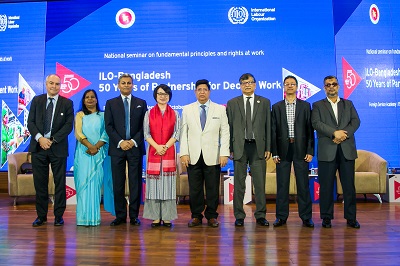Diplomatic correspondent
Published:2022-10-20 18:04:19 BdST
Govt, ILO mark their 50 years of partnership on promoting social justice and decent work
Foreign Minister AK Abdul Momen has said that the spirit of the fundamental principles and rights at work are embedded in the constitution of Bangladesh steered by the Father of the Nation Bangabandhu Sheikh Mujibur Rahman.
He reiterated, “Bangladesh is committed to ensure compliance with International Labour Standards in a feasible and incremental manner. Our government announced the decision to launch a universal pension scheme from next year.”
Foreign Minister Momen in his speech urged the ILO to give enhanced focus on supporting the government and social partners for the drastic transformations taking place in the world of work in view of climate change, digitalization, artificial intelligence and other factors.
The Foreign Minister was addressing a seminar on Wednesday (Oct 19) organised jointly by the Ministry of Foreign Affairs and ILO on ‘Fundamental Principles and Rights at Work’ to mark the 50 years since Bangladesh joined the International Labour Organization (ILO) as a member state.
Held at the Foreign Service Academy in Dhaka, the speakers discussed the progression in the areas of labour rights, decent work and social justice. Foreign Secretary Masud Bin Momen made the opening remarks.
ILO’s Regional Director and Assistant Director General for Asia and the Pacific, Chihoko Asada-Miyakawa presented a keynote to the audience on how Bangladesh is advancing the fundamental principles and rights at work.
She appreciated the government of Bangladesh for ratifying eight fundamental conventions, two governance conventions and 26 technical conventions, and urged that the focus should now be on their implementation of these labour standards.
Miyakawa said: “In the 2021 International Labour Conference, like other 181 countries, Bangladesh unanimously adopted the Global Call to Action for a Human centred Recovery that can guide to recover from the impact of the COVID-19 crisis. Now more than ever before, public policy for Bangladesh needs to be more inclusive, sustainable, and resilient. An important part of giving everyone a fair chance in the development pathway is to give top priority to the fundamental values of freedom, human dignity, social justice, security, and non-discrimination.”
Md Ehsan-E-Elahi, Secretary of the Ministry of Labour and Employment said, ‘As a leading Ministry for achieving SDG goal 8 we have taken many initiatives including labour sector reform, adoption of national occupation safety and health policy, national action plan for eliminating child labour by 2025, piloting employment insurance scheme and creation of employment department. All these initiatives will ensure labour rights at work.
Md Moinul Kabir, Secretary of the Legislative and Parliamentary Affairs Division acknowledged the technical cooperation support of ILO to the government for setting the labour standards for the country’s people those who are involved in the world of work.
Ardashir Kabir, president of Bangladesh Employers’ Federation (BEF) said, ‘BEF provides guidance and assistance to employers in the field of industrial relations and brings their concerted views on labour matters to the attention of the Government. BEF believes that effective private sector engagement can improve labour rights and industrial relations at the workplace.’
Shamim Ara, Chairperson of the National Coordination Committee for Workers Education (NCCWE) mentioned how government initiatives and ILO’s technical support are transforming the workers’ condition in Bangladesh.
She said, “We should focus on the numerous challenges that remain for millions of workers including 87% informal economy workers and returnee migrants who had to repatriate during the COVID-19 pandemic. Re-skilling, up-skilling and recognition of their skills and accommodating them in the relevant field of employment is crucial.”
Tuomo Poutiainen, Country Director of ILO Bangladesh; senior UN officials, officials of various ministries, civil society dignitaries and media persons.
ILO is currently implementing the third Decent Work Country Programme (2021-25) for Bangladesh, which will continue to support the implementation of the United Nations Sustainable Development Cooperation Framework (UNSDCF) in the country.
The ILO’s four pillars of decent work provide the core drivers for the contributions of the DWCP to UNSDCF implementation in this context. The pillars are: (i) promoting jobs and enterprise; (ii) guaranteeing rights at work; (iii) extending social protection; and (iv) promoting social dialogue, with gender equality as a cross-cutting theme. These pillars are crucial to advancing the entire sustainable development agenda.
Before this national seminar, the Regional Director and Assistant Director General for Asia and the Pacific of ILO Ms Chihoko Asada-Miyakawa paid a courtesy call on Ambassador Masud Bin Momen, Foreign Secretary (Senior Secretary) as part of her ongoing official visit to Bangladesh.
During the bilateral meeting, Ms Miyakawa appreciated Bangladesh’s active representation as a member state in ILO’s Governing Body and discussed avenues to further strengthen the existing labour reforms and issues concerning the world of work.
Unauthorized use or reproduction of The Finance Today content for commercial purposes is strictly prohibited.


